|
|
|
Sort Order |
|
|
|
Items / Page
|
|
|
|
|
|
|
| Srl | Item |
| 1 |
ID:
104821


|
|
|
| 2 |
ID:
090105
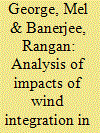

|
|
|
|
|
| Publication |
2009.
|
| Summary/Abstract |
As the share of wind in power systems increases, it is important to assess the impact on the grid. This paper combines analysis of load and generation characteristics, generation adequacy and base and peak load variations to assess the future role of wind generation. A simulation of Tamil Nadu in India, with a high penetration of wind power (27% by installed capacity), shows a capacity credit of 22% of the installed wind capacity. For seasonal wind regimes like India, neither the capacity factor, nor the capacity credit reflects the monthly variation in the wind generation. A new approach based on the annual load duration curve has been proposed for generation expansion planning with higher penetration of wind. The potential savings in base and peak capacity required with increasing wind power have been quantified. A future scenario for Tamil Nadu for 2021 has been illustrated. It was found that 5500 MW of wind power can save 3200 MU of peak energy required or an average peak capacity of 2400 and 1100 MW of base capacity. This analysis would be useful to assess the future impacts of increasing wind capacity in grids.
|
|
|
|
|
|
|
|
|
|
|
|
|
|
|
|
| 3 |
ID:
131907
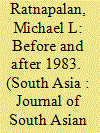

|
|
|
|
|
| Publication |
2014.
|
| Summary/Abstract |
This paper discusses the material effects of the theorisation of the contemporary Sri Lankan Tamil diaspora around the 1983 Colombo riots. In the complicated aftermath of the end of the Sri Lankan civil war in 2009, it is necessary to rethink the way in which diasporic history has been constructed in order to factor in its multiple dimensions and underlying dynamics. By critically foregrounding the key literature on the Sri Lankan Tamil diaspora, which is definitive to understanding the history of Sri Lankan Tamil emigration around the 1983 riots, the modern diaspora can be framed anew by longer and more diverse historical perspectives.
|
|
|
|
|
|
|
|
|
|
|
|
|
|
|
|
| 4 |
ID:
090338
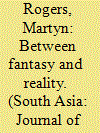

|
|
|
|
|
| Publication |
2009.
|
| Summary/Abstract |
Film permeates all spheres of Tamil Nadu social life extending into the domains of state governance and political discourse. Every chief minister since the 1960s and many prominent politicians, for instance, have previously been film actors, directors or screen writers. Many Tamil politicians, therefore, use film as a propaganda tool, as well as utilising their own fan club membership as potential election vote banks. Focusing on the fan club network of one prominent Tamil politician, the veteran actor Vijayakanth, the article investigates this link between politics and film culture. It argues that social theorists analysing this social phenomenon focus too much attention on the propaganda function of film texts rather than examining actual embodied social relationships within the interrelated arenas of film culture and politics. Consequently, this focus overlooks fans' political agency. Countering this perspective, the article argues that, in fact, Tamil film star fan clubs provide important social spaces for fans' participation in the democratic political process, even though these spaces are hierarchically structured and function to contain youthful exuberance.
|
|
|
|
|
|
|
|
|
|
|
|
|
|
|
|
| 5 |
ID:
102112
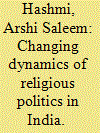

|
|
|
| 6 |
ID:
133698
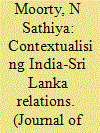

|
|
|
|
|
| Publication |
2014.
|
| Summary/Abstract |
Unlike what may have been reduced to in some circles, India- Sri Lanka relations are not a 'one-issue affair', centred on the vexatious ethnic problem in the island-nation, or on its influence and impact on
the south Indian State of Tamil Nadu. Instead, they continue to be multi-dimensional and multifarious, standing as testimony and test- case to the path of greater regional stability and cooperation, which
is in the interest of South Asia as a whole.
|
|
|
|
|
|
|
|
|
|
|
|
|
|
|
|
| 7 |
ID:
151141
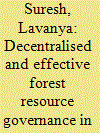

|
|
|
|
|
| Summary/Abstract |
Within the context of decentralised environmental governance, this article seeks to answer the question which institutional arrangements may be most effective in delivering the promise of better community-centred forest governance. The specific objective is to analyse the impact that decentralisation of resource management has on the effectiveness of forest governance. Using a comparative case study framework, the article finds that decentralisation functions better when nested structures with a plurality of bodies are in operation. However, the case studies also highlight the need for constant monitoring as a necessarily ongoing crucial process to protect the ecological sustainability of forest resource governance as well as strengthening equitable social structures at the village level.
|
|
|
|
|
|
|
|
|
|
|
|
|
|
|
|
| 8 |
ID:
109722
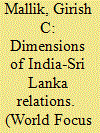

|
|
|
| 9 |
ID:
112417


|
|
|
|
|
| Publication |
2012.
|
| Summary/Abstract |
India's role in Sri Lanka assumes more significance now than before, with the end of war and devolution of power sharing in limbo. While the LTTE is wiped out militarily and isolated internationally, the existing militarisation in Jaffna with war crime charges at UN and awaiting political solution in limbo, Sri Lanka demands India's attention. The call for India's greater engagement with Sri Lanka had resurfaced domestically with a demand from Tamil Nadu parties urging India to play a more proactive role pertaining to rebuilding and sustaining peace in post-war Sri Lanka, and in ending assault on Indian fisherman at Palk Strait. On other hand, the fostering of ties between Sri Lanka and Pakistan and China push for more primed hands-on role from the point of view of India's long-term strategic interest. There is, therefore, a need to have a re-look of India's policy options towards Sri Lanka in light of recent developments.
|
|
|
|
|
|
|
|
|
|
|
|
|
|
|
|
| 10 |
ID:
115906
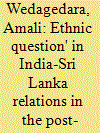

|
|
|
|
|
| Publication |
2013.
|
| Summary/Abstract |
The 'ethnic question' in Sri Lanka, even after the defeat of the Liberation Tigers of Tamil Eelam (LTTE), evokes a sense of suspense, uncertainty and even a possible conflict of interest in the otherwise robust and multifaceted relationship between India and Sri Lanka. The article adopts a multi-agent model derived from the positional analysis and identifies three principal agents in Indo-Sri Lanka relations-the Government of Sri Lanka (GoSL), the Government of India (GoI) and Tamil Nadu. Based on interviews and interaction with a wide cross-section of respondents in India and Sri Lanka, the article argues that GOSL is better placed to address the ethnic question today, especially because of changes in the outlook of the GoI and Tamil Nadu.
|
|
|
|
|
|
|
|
|
|
|
|
|
|
|
|
| 11 |
ID:
142602
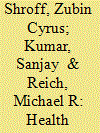

|
|
|
|
|
| Summary/Abstract |
We used individual level survey data to examine the distribution of health insurance and other welfare programs by the Dravida Munnetra Kazhagam (DMK) government in Tamil Nadu. Core DMK supporters were more likely to receive welfare benefits than swing voters and opposition loyalists. Political analysis is important to understand motivations for establishing these programs.
|
|
|
|
|
|
|
|
|
|
|
|
|
|
|
|
| 12 |
ID:
082556
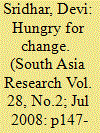

|
|
|
|
|
| Publication |
2008.
|
| Summary/Abstract |
The World Bank has become the largest financial contributor to health-related and nutrition projects, committing more than $1 billion annually towards the health, nutrition and population sector. This article examines how the World Bank addressed malnutrition in Tamil Nadu and discusses the consequences of this approach for the Bank's projects and target communities. Using the case study of the Tamil Nadu Integrated Nutrition Project (TINP), it is argued that the World Bank nutrition package, now implemented in several countries, might not be effective in extremely poor and destitute communities because it does not address the underlying social causes of malnutrition. The final section of the article goes 'inside' the Bank to examine two institutional drivers that could explain the promotion of the TINP approach to undernutrition
|
|
|
|
|
|
|
|
|
|
|
|
|
|
|
|
| 13 |
ID:
092217
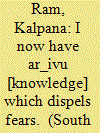

|
|
|
|
|
| Publication |
2009.
|
| Summary/Abstract |
During the 1980s and 1990s, I developed a familiarity with a very specific sub-culture in Tamil Nadu-the Catholic fishing communities of Kanyakumari, who live in a string of sandy villages stretching from the Cape itself, up to the border with Kerala. I was at this point particularly interested in popular religion and its construction of the female body. Following on from that interest, and set off against the backdrop of a familiarity with the social life of these villages, I began a series of wide-ranging sets of interviews with women I already knew on the ways they framed their experiences of puberty and maternity. The interviews threw up, as I had suspected, an intersecting range of discursive frames. And the book I will eventually bring out on this topic will be as much about the relationship between different kinds of intellectuals and rural people as it will be about female experiences per se. The interviews were deliberately conducted with those active in non-government organisations (NGOs) run by Catholic organisations in the district, as well as with school teachers, priests, midwives and healers of different kinds, with doctors, as well as with ordinary women from different age sets.
|
|
|
|
|
|
|
|
|
|
|
|
|
|
|
|
| 14 |
ID:
092194
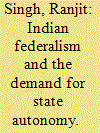

|
|
|
|
|
| Publication |
2009.
|
| Summary/Abstract |
The essence of federalism lies not in the constitutional or institutional structure but in society itself. A federal government is a device by which the federal qualities of a society are articulated and protected.
|
|
|
|
|
|
|
|
|
|
|
|
|
|
|
|
| 15 |
ID:
089652
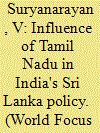

|
|
|
|
|
| Publication |
2009.
|
| Summary/Abstract |
How does one explain the paradigm shift in New Delhi-Chennai equation? Was it due to the "coalition dharma" practiced by the central government, in which the DMK is an important partner? Was it due to Karunanidhi's keen desire to strengthen his political links with Congress President Sonia Gandhi at a time when sections within the congress were toying with the idea of a coalition with the AIADMK in the post election scenario? Was the policy dictated by the Chief Minister's desire to ensure important cabinet berths to his near and dear ones in the Central Government?
|
|
|
|
|
|
|
|
|
|
|
|
|
|
|
|
| 16 |
ID:
066168
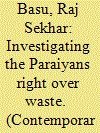

|
|
|
| 17 |
ID:
067990
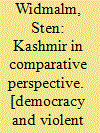

|
|
|
|
|
| Publication |
New Delhi, Oxford University Press, 2002.
|
| Description |
xxvii, 226p.: maps, abbre.pbk
|
| Standard Number |
0195470052
|
|
|
|
|
|
|
|
|
|
|
|
Copies: C:1/I:0,R:0,Q:0
Circulation
| Accession# | Call# | Current Location | Status | Policy | Location |
| 050837 | 954.6052/WID 050837 | Main | On Shelf | General | |
|
|
|
|
| 18 |
ID:
114440
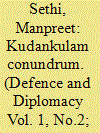

|
|
|
|
|
| Publication |
2012.
|
| Summary/Abstract |
The first of the two 1,000 MW nuclear power plants under construction
for the last decade
1
at Kudankulam was due to become operational before
the end of this year. What it stares at instead is a delayed future after the
Tamil Nadu Cabinet passed a resolution in September 2011 to suspend
work on the nuclear reactor. Chief Minister Jayalalitha claimed to have
been compelled to do so in response to the public protests against the
nuclear plant, and she certainly had an eye on the local elections that
were due less than a month before the protests broke out.
2
|
|
|
|
|
|
|
|
|
|
|
|
|
|
|
|
| 19 |
ID:
102055
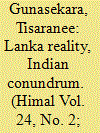

|
|
|
| 20 |
ID:
132493
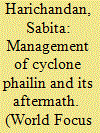

|
|
|
|
|
| Publication |
2014.
|
| Summary/Abstract |
Phailin, a tropical cyclone with wind speed of 220 kmph hit Odisha coast on 12 October 20l3,leaving
a trail of destruction. Tropical cyclone is a storm system characterized by a low pressure centre which produces a.strong wind and ?ooding rain. Tropical cyclones are named to provide easy communication between forecasters and the public. Phailin represented the second-stronger tropical cyclone after 1999 Super Cyclone. There is no gainsaying the fact that Odisha with a coastline of 4801-cm is prone to natural disasters like tropical cyclones, storm surge, whirl wind, tsunami and rain-induced ?oods on account of its sub-tropical littoral location. The 480 Km. long coastline of Odisha extends from Balasore in the North to Ganjam Coast in the South. These natural hazards cause immense damage to life and property. According to reports of Indian Meteorological Department (IMD), total number of cyclonic storms and severe cyclonic storms crossing Odisha coast between 1891 to 2000 was 98 while 69, 79 and 62 cyclones struck the coasts of West Bengal, Andhra Pradesh and Tamil Nadu respectively. Super Cyclone of 1999 devastated 14 districts of Odisha with 'catastrophic human consequences.
|
|
|
|
|
|
|
|
|
|
|
|
|
|
|
|
|
|
|
|
|